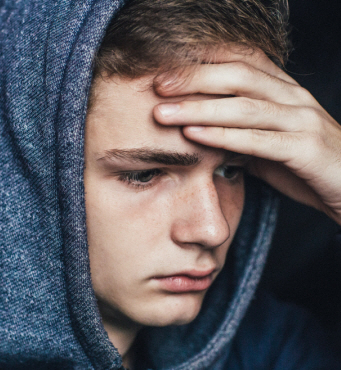
The pandemic has presented a myriad of challenges that we have had to navigate around and weather through. Many parents and mental health providers have reported noticing an increase in youth experiencing symptoms of depression and anxiety over the past few years.
Anxiety and depression can manifest in many different ways. If you’ve noticed a change in your child’s behavior or are wondering how to know if your child needs help, here are some general signs to look for:
- Recent changes in mood. Changes in affect may show up as irritability, swift changes in mood, crying, tearfulness, increased anger or hostility and difficulty regulating their emotions (intense reactions to a situation/event).
- Withdrawal. Instead of engaging in activities with family, friends or doing things they usually enjoyed, they may withdraw, self isolate, or spend more time alone in their room.
- Sleep. A shift in sleep patterns may be present. There may be an increase in taking naps, difficulties waking up or falling or staying asleep.
- Low energy. Lethargy may be demonstrated as an expression of boredom, difficulty getting going and actively engaging in activities. Your child may be less active than usual.
- Expressions of low self-esteem, guilt, hopelessness may show up as comments they make about themselves or others.
- Increased sensitivity to criticism, rejection or failure and sometimes even changes in routine, as demonstrated by intense emotional responses that are unusual for your child.
- Frequent complaints of headaches or stomach aches. .
- Difficulty with relationships such as increased conflict with peers, siblings and parents.
- Poor concentration at home and school, where paying attention or focusing on tasks or conversations may be more challenging or they may appear easily distracted.
- School performance and attendance may be impacted as evidenced by declining grades, lack of homework completion or frequent absences.
- Changes in eating habits and patterns, such as a loss of appetite, reduced consumption or conversely, eating or snacking more than usual.
- Thoughts or attempts to run away. This is more evident with older children.
- Thoughts/expression of suicide or self- harming behaviors such as cutting, substance use, engaging in risky behaviors with peers.
If you’ve noticed any changes in behaviors with your child:
- Have a private conversation with your child to discuss what may be going on. Express your concerns gently, without judgment.
- Validate their emotions and be willing to ask open ended questions even the tough ones like thoughts of self-harm or suicide..
- Avoid going into problem solving mode right away and giving them ideas and suggestions on how to “fix the issue”. Listen and validate.
- Try to normalize their experience and be open to sharing your own struggles.
If your gut tells you that they are struggling and something is wrong, reach out to a mental health professional for help. For older children especially (middle school and up), having an open discussion about going to therapy before you schedule an appointment can increase cooperation and help them feel cared for.

Recent Comments